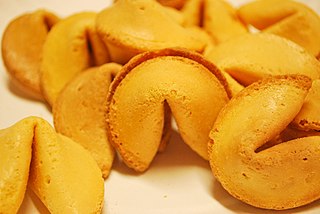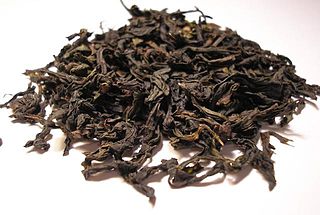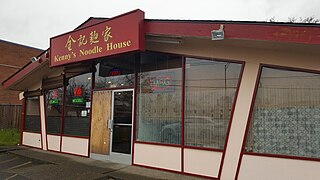Related Research Articles

American Chinese cuisine is a cuisine derived from Chinese cuisine that was developed by Chinese Americans. The dishes served in many North American Chinese restaurants are adapted to American tastes and often differ significantly from those found in China.

A fortune cookie is a crisp and sugary cookie wafer usually made from flour, sugar, vanilla, and sesame seed oil with a piece of paper inside, a "fortune", usually an aphorism, or a vague prophecy. The message inside may also include a Chinese phrase with translation and/or a list of lucky numbers used by some as lottery numbers. Fortune cookies are often served as a dessert in Chinese restaurants in the United States, Canada and other countries, but they are not Chinese in origin. The exact origin of fortune cookies is unclear, though various immigrant groups in California claim to have popularized them in the early 20th century. They most likely originated from cookies made by Japanese immigrants to the United States in the late 19th or early 20th century. The Japanese version did not have the Chinese lucky numbers and was eaten with tea.

Yum cha is the Cantonese tradition of brunch involving Chinese tea and dim sum. The practice is popular in Cantonese-speaking regions, including Guangdong province, Guangxi province, Hong Kong, and Macau. It is also carried out in other regions worldwide where there are overseas Cantonese communities. Yum cha generally involves small portions of steamed, pan-fried, or deep-fried dim sum dishes served in bamboo steamers, which are designed to be eaten communally and washed down with hot tea. People often go to yum cha in large groups for family gatherings and celebrations.

Pocky is a Japanese sweet snack food produced by the Ezaki Glico food company. Pocky was first sold in 1966, and was invented by Yoshiaki Koma. It consists of coated biscuit sticks. It was named after the Japanese onomatopoeic word pokkiri (ポッキリ), which is supposed to resemble the sound of the snack being cracked.

Cha chaan teng, often called a Hong Kong-style cafe or diner in English, is a type of restaurant that originated in Hong Kong. Cha chaan teng are commonly found in Hong Kong, Macau, and parts of Guangdong. Due to the waves of mass migrations from Hong Kong in the 1980s, they are now established in major Chinese communities in Western countries such as Australia, Canada, the United Kingdom, and the United States. Likened to a greasy spoon cafe or an American diner, cha chaan tengs are known for eclectic and affordable menus, which include dishes from Hong Kong cuisine and Hong Kong-style Western cuisine. They draw comparisons to Western cafés due to their casual settings, as well as menus revolving around coffee and tea.

Comfort food is food that provides a nostalgic or sentimental value to someone, and may be characterized by its high caloric nature, high carbohydrate level, or simple preparation. The nostalgia may be specific to an individual, or it may apply to a specific culture.

The Natural History Museum of Los Angeles County is the largest natural and historical museum in the western United States. Its collections include nearly 35 million specimens and artifacts and cover 4.5 billion years of history. This large collection is comprised not only of specimens for exhibition, but also of vast research collections housed on and offsite.

The California African American Museum (CAAM) is a museum located in Exposition Park, Los Angeles, California, United States. The museum focuses on enrichment and education on the cultural heritage and history of African Americans with a focus on California and western United States. Admission is free to all visitors. Their mission statement is "to research, collect, preserve, and interpret for public enrichment the history, art and culture of African Americans with an emphasis on California and the western United States."

Wuyi tea, also known by the trade name Bohea in English, is a category of black and oolong teas grown in the Wuyi Mountains of northern Fujian, China. The Wuyi region produces a number of well-known teas, including Lapsang souchong and Da Hong Pao. It has historically been one of the major centers of tea production in Fujian province and globally. Both black tea and oolong tea were likely invented in the Wuyi region, which continues to produce both styles today.

Momofuku Ando, was an inventor and businessman who founded Nissin Food Products Co., Ltd. He is known as the inventor of instant noodles and the creator of the brands Top Ramen and Cup Noodles.

Cathay Bank is an American bank founded in 1962.

Sceneway Plaza is a shopping centre in Lam Tin, Kowloon, Hong Kong. It also contains the East Kowloon Office of the Immigration Department. Opened in February 1992, the shopping centre is located adjacent to Lam Tin station of Hong Kong's Mass Transit Railway (MTR). The plaza, which used to be a Japanese department store called Yaohan, contains many small stores including fashion, stationery, and music shops.

Ajisen Ramen is a Japan-based chain of fast food restaurants selling Japanese ramen noodle soup dishes. The company's logo, featuring artwork of a little girl named Chii-chan, can be found on their stores and products. Outside of Japan, Ajisen Ramen has outlets in Australia, Cambodia, Canada, China, Egypt, Hong Kong, Indonesia, Malaysia, the Marianas, Mongolia, the Philippines, Singapore, South Korea, Thailand, the United States, Vietnam, Morocco and Panama. There are over 700 Ajisen Ramen restaurants.

The Consulate-General of the People's Republic of China in Los Angeles is the People's Republic of China's (PRC) diplomatic mission headquartered at 443 Shatto Place in the Koreatown neighborhood of Los Angeles, California, United States. The passport and visa office is on the third floor of 500 Shatto Place, Los Angeles, California. The consulate's service area is Southern California, Arizona, Hawaii, New Mexico, and the U.S. Pacific territories.
Master Kang is the largest instant noodle producer in China.
The Ivy is a restaurant located on Robertson Boulevard in Los Angeles founded and owned by chef Richard Irving and interior designer Lynn von Kersting. They now run the restaurant alongside their daughter India von Kersting Irving. Open since 1983, The Ivy is known for its historic significance to the LA food scene, its popularity with celebrities, its distinctively colourful interiors and its simple, classic menu.

The Hong Kong Café was a Los Angeles restaurant and music venue that was a part of the Los Angeles punk rock scene during the late 1970s and early 1980s when the club was owned and operated by Barry Seidel, Kim Turner and Suzie Frank,followed by a resurgence from 1992 to 1995.

Kenny's Noodle House is a Chinese restaurant in Portland, Oregon.
References
- 1 2 3 Lee, Jennifer 8. (2008-03-03). The Fortune Cookie Chronicles: Adventures in the World of Chinese Food. Twelve. ISBN 978-0446580076 . Retrieved 2022-07-30.
- ↑ "Collections: Got Fortune?". Smithsonian Asian Pacific American Center. 2010-12-03. Retrieved 2022-07-29.
- 1 2 Yee Lau, Chrissy (2013-08-14). "The mysterious can of fortune". National Museum of American History. Retrieved 2022-07-30.
- ↑ "Hong Kong Noodle Company Tea Cakes Tin". National Museum of American History. Retrieved 2022-07-30.
Coordinates: 34°02′11″N118°15′03″W / 34.036286°N 118.250925°W